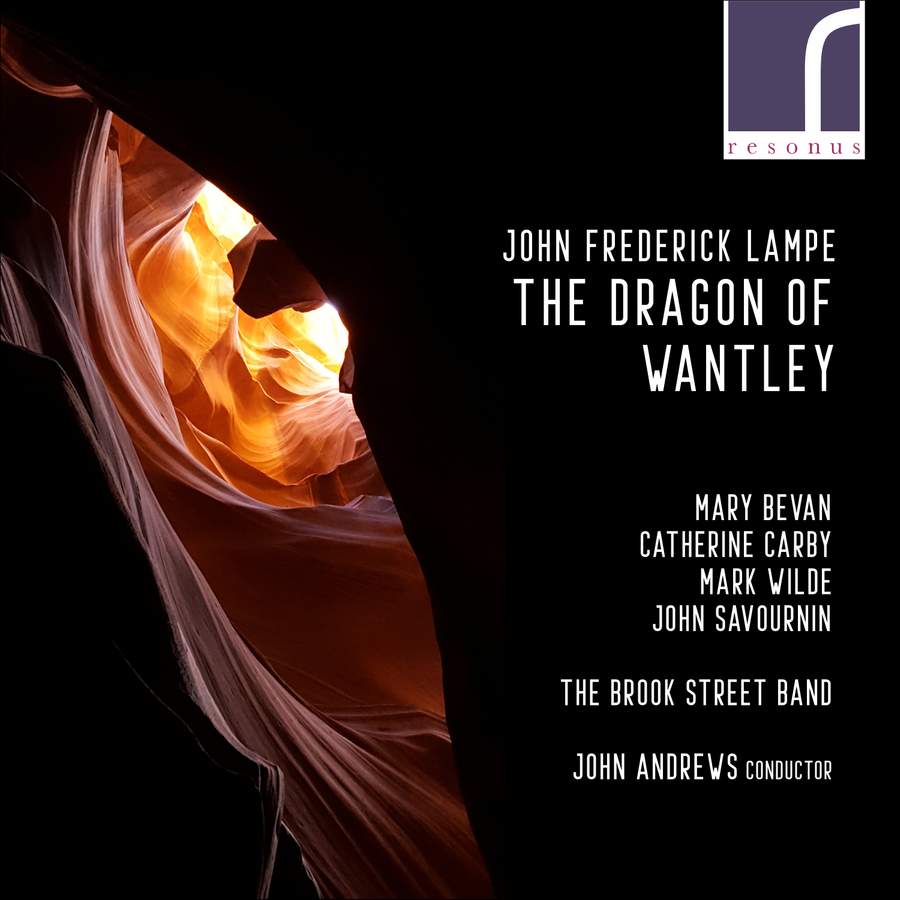LAMPE The Dragon of Wantley
View record and artist detailsRecord and Artist Details
Genre:
Opera
Label: Resonus Classics
Magazine Review Date: 10/2022
Media Format: CD or Download
Media Runtime: 108
Mastering:
DDD
Catalogue Number: RES10304

Tracks:
| Composition | Artist Credit |
|---|---|
| (The) Dragon of Wantley |
John Frederick Lampe, Composer
(The) Brook Street Band Catherine Carby, Mauxalinda, Mezzo soprano John Andrews, Conductor John Savournin, Gaffer Gubbins; Dragon, Bass-baritone Mark Wilde, Moore of Moore Hall, Tenor Mary Bevan, Margery, Soprano |
Author: Richard Lawrence
What a surprise! This comic opera, popular in its day, has been languishing as a passing reference in the history books. Now it has been brought to life in this excellent performance by The Brook Street Band under John Andrews. The edition used was produced by the scholar Peter Holman (co-founder of The Parley of Instruments) from a conflation of two scores: the published full score, which omitted the recitatives, and a manuscript version which included the recitatives but shortened or omitted the other material.
The humour lies in the disparity between the Italianate music by John Frederick Lampe, a German who made his home in England, and the deliberately awful libretto by Henry Carey (author and composer of, inter alia, ‘Sally in our alley’ and composer of the tune to Addison’s ‘The Lord my pasture shall prepare’): a typical couplet runs ‘Zeno, Plato, Aristotle / All were lovers of the bottle’. The target was the conventions of opera seria as exemplified in the operas of Handel, whom Lampe knew. It says much for the older man’s good humour that, according to a letter quoted by John Andrews in the booklet, ‘tho’ ’tis a burlesque on the opera’s, yet Mr Handel owns he thinks the tunes very well compos’d’. It was first performed at the Little Theatre in the Haymarket on May 16, 1737. It is perhaps stretching a point to suggest that Handel had the Dragon’s ‘Oh ho! Master Moore’ in mind when composing ‘The people that walked in darkness’ in Messiah (1741) – voice and strings in octaves, same key of B minor – but it would not be unreasonable to find an echo of ‘O ruddier than the cherry’ from Acis and Galatea in Moore’s ‘By the beer as brown as berry’ (same key of G minor).
The story is based on a ballad about the dragon of Wantley and Moore of Moore Hall. The dragon has been ravaging the population: Margery (‘of Roth’ram Green’) advises her father, Gaffer Gubbins, that Moore is the man to slay it. Moore is more interested in drinking, but accepts the task in return for Margery’s love. Unfortunately he has already promised to marry Mauxalinda: the two women have a slanging match that will have reminded contemporaries of the rivalry between Handel’s star sopranos Cuzzoni and Bordoni. Moore kills the dragon ‘by a kick on the back-side’ and gets his reward; Mauxalinda seems reconciled to her loss.
Moore’s opening gavotte (‘Zeno, Plato …’) is, like most of the songs, in da capo form. Mark Wilde makes slightly heavy weather of it but settles down to give an amusing performance of our two-timing hero. John Savournin, doubling as Gubbins and the Dragon, is ideally firm of voice. The women quarrel with vigour (‘Insulting gypsy / You’re surely tipsy’) and are supremely touching in the serious numbers, despite the music’s being subverted by the silliness of the words. Margery opens Act 2 with a sad, chromatic song after dreaming that Moore has been slain; while Mauxalinda begs forgiveness after attempting to murder her rival, the latter’s plea beautifully accompanied by the solo cello – no keyboard harmony – of Tatty Theo, founder of the Band. Mary Bevan and Catherine Carby are absolutely ideal.
The orchestration is splendid: trumpets and horns in the choruses (which are sung by the soloists), and the horns get some melodic work in the ‘First Tune’ too. The first oboe is kept busy – a bouquet for Joel Raymond – and the whole thing is exhilaratingly conducted by John Andrews. Now, who is going to accept the challenge of recording another fine English opera: The Duenna (1775) by the Thomas Lindleys, father and son, to a libretto by Sheridan?
Discover the world's largest classical music catalogue with Presto Music.

Gramophone Digital Club
- Digital Edition
- Digital Archive
- Reviews Database
- Full website access
From £8.75 / month
Subscribe
Gramophone Full Club
- Print Edition
- Digital Edition
- Digital Archive
- Reviews Database
- Full website access
From £11.00 / month
Subscribe
If you are a library, university or other organisation that would be interested in an institutional subscription to Gramophone please click here for further information.




